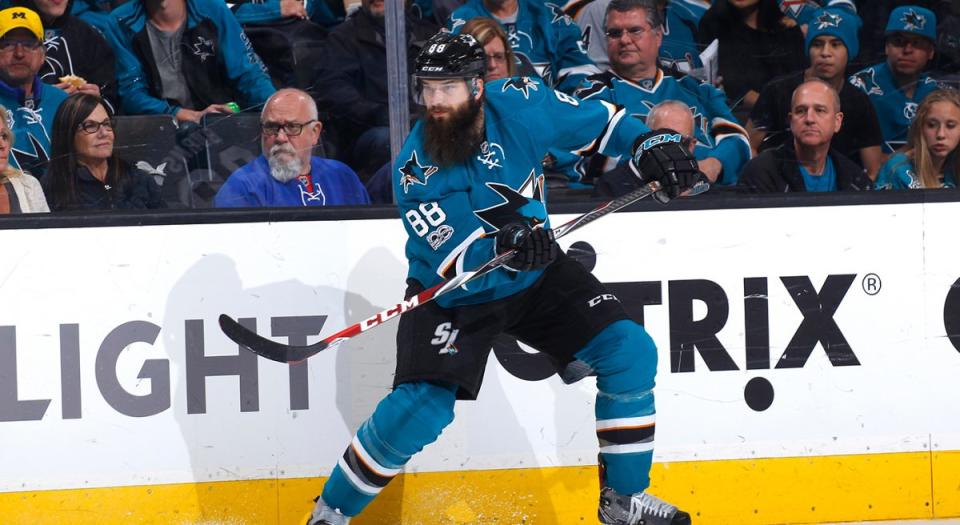Is Erik Karlsson's legacy being distorted?
This working theory was hardly a novel concept to Pierre Dorion.
Asked if Erik Karlsson, plausibly the greatest defenceman of his generation, could lose out on the Norris Trophy in the two most outstanding seasons of his illustrious eight-year career – if overlooked in consecutive ballots – Dorion didn’t need to deliberate.
“Yup.”
“A little irony in that, isn’t there?”
“Oh, for sure.”
However backward, this will be the accepted outcome if Brent Burns is voted in as the league’s top defenceman this season, as expected.
The San Jose Sharks rover has held the distinction of presumptive winner since about the time Shea Weber’s smashing introduction fizzled after a one-month reign. Burns earned his buzz with increasing double-digit point totals from month-to-month leading up to the All-Star break, a hot start that created enough headway to survive a late-season funk and outlast his peers in the points race, while ranking with the NHL’s most productive players with a top-ten finish in the scoring table with 29 goals and 76 points.
He finished with five points more than Karlsson, whose late-season pursuit ended when he was in and out of the lineup (decisions that seemingly hinged on the importance of the game) with a foot issue down the stretch.
We suppose it’s not impossible that a superior defenceman’s superior seasons happened to fail to measure up to a few individual spikes in the careers of other talented defenders. But clinging to this assumption would be choosing not to chew over the flaws in a system that, for whatever reason, seems to be working against Karlsson since he became a two-time winner of the award in 2014-15.
Because as brilliant as Burns’ bid was, it wasn’t the historic offensive campaign that Karlsson had last season when voters turned to Drew Doughty. Karlsson’s 82 points were tops off the blue line in two decades. He finished fourth in league scoring, claiming the first league-wide top-five finish for a defender in 30 years. What’s more, with 66 assists, Karlsson became the first defender since Bobby Orr to lead the league in that department.
By comparison, Burns’ recently curtailed pace saw him turn in essentially a repeat performance to the season he had last, when he was overshadowed by Karlsson’s outrageous totals and placed third.
Shine the light on Karlsson

Now, this isn’t intended to slam Burns. He had an outstanding season, and deserves to be recognized for it. And it’s not supposed to rehash the debate over Doughty’s contentious win (though if it were the other way around, there would be less stewing in Ottawa).
Instead, it’s to shine the light on Karlsson, who after his record-breaking attacking season, managed to do even more for the playoff-bound Senators.
“We’re seeing the best overall complete version of Erik Karlsson this year. No ands, ifs or buts about it. No doubt. I will challenge anyone that doesn’t say Erik is the most dynamic player in this league,” the Ottawa Senators general manager told Yahoo Canada Sports.
“And I would challenge anyone that says he’s not (the player) most important to any team than he is to ours.”
Save for witness accounts, however, there isn’t clear quantitative evidence to suggest that this season was better than the one previous – let alone the most valuable in the NHL this season. His production did drop, though Dorion was correct when pointing out the dip wasn’t “drastic.” And for the first time in his career, Karlsson wound up on the wrong side of shot-based possession measures, scoring an adjusted 49.27 percent.
There are several explanations for Karlsson’s possession discrepancy (beyond his shins, which are wearing the effects of a top-ten shot-blocking season over the past six years), but the prevailing logic is that his prominent role in Guy Boucher’s defensive-first system has different requirements. Karlsson is expected to sit back, tend to matters in his own end first, and resist the urge to linger in the attacking zone in lieu of a change, when before he was without a leash.
This sort of priority shift requires a willingness to make concessions in a league where goals and assists equate to dollar and cents. It’s not something all players are willing to do (and that’s why Doughty’s routinely lauded for it), but it’s far easier when it manifests in the sort of results Ottawa’s achieved under Boucher. With Karlsson setting the example, the Senators allowed 31 fewer goals in a season with scoring up across the board, improving from 26th to 10th overall.
But while Boucher’s demands for accountability are undeniable, Dorion is reluctant to divvy up the credit when assessing Karlsson’s growth into his most complete version of himself.
“This game is about the players. It’s about what the players can do. And in Erik’s case, he just said, ‘I’m going to do everything that I can do to be the best that I can be so the Ottawa Senators win.’ And that says a lot about Erik.”
Whether the Senators aren’t a playoff team without Karlsson’s commitment to Boucher’s structure is arguable. We can say this with certainty, however: Ottawa wasn’t returning to the postseason without his contributions offensively.
Karlsson had his third-best offensive season in terms of five-on-five efficiency with 1.47 points per 60 minutes, and finished a hair behind Burns with 0.92 points per game, placing him in the NHL’s top 15 in scoring efficiency.
But again, to appropriately contextualize Karlsson’s contributions, we have to evaluate what he did in the system he embraced. Consider this: Karlsson was in on 34.5 percent of Ottawa’s goals, which is the second highest contribution rate of his career and a greater share than his two previous Norris Trophy seasons.
Sidney Crosby, who missed a handful of games as well, was in on 32 percent of the Pittsburgh Penguins’ total goals.
“If you listened to all the pundits who said, ‘How will Erik ever find a way to produce under Guy’s system?’ Erik can find a way to produce in any system, and at the same time be a top-end defender to allow us to win,” Dorion said.
There’s a natural inclination in this sport to disperse recognition, to seek out other individuals to heap praise on. But while it’s fun and fresh and compelling to watch players come into their own, and burst onto the scene, being swept up in what’s new can come at a consequence.
And in the case of Karlsson, that includes running the risk of distorting legacy.



